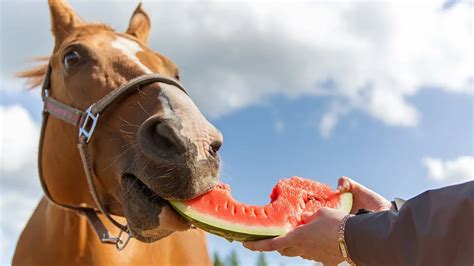As the summer months approach, many horse owners are looking for ways to keep their equine friends cool and comfortable. One refreshing treat that comes to mind is watermelon. But can horses eat watermelon safely? In this article, we'll explore the answer to this question and provide some helpful tips on how to feed watermelon to your horse.
The Importance of Hydration in Horses
Before we dive into the topic of watermelon, it's essential to understand the importance of hydration in horses. Horses need access to plenty of fresh water to stay healthy, especially during the hot summer months. Dehydration can lead to a range of health problems, including digestive issues, kidney damage, and even heat stroke.

Can Horses Eat Watermelon?
Now, let's get to the question at hand: can horses eat watermelon safely? The answer is yes, but with some caution. Watermelon is a nutritious and refreshing treat that can provide horses with essential vitamins, minerals, and antioxidants. However, it's crucial to introduce watermelon into your horse's diet in moderation and with some guidelines in mind.
Benefits of Watermelon for Horses
Watermelon is a nutrient-rich fruit that offers several benefits for horses. Here are some of the key advantages of feeding watermelon to your horse:
- Hydration: Watermelon is made up of about 92% water, making it an excellent way to help keep your horse hydrated, especially during hot summer months.
- Vitamins and Minerals: Watermelon is a good source of vitamins A and C, as well as minerals like potassium and magnesium.
- Antioxidants: Watermelon contains antioxidants like lycopene and citrulline, which can help protect your horse's cells from damage and reduce inflammation.
Risks and Precautions
While watermelon can be a healthy treat for horses, there are some risks and precautions to consider:
- Choking Hazard: Watermelon seeds and rinds can be a choking hazard for horses, so make sure to remove them before feeding.
- Digestive Issues: Some horses may experience digestive issues, such as diarrhea or stomach upset, if they eat too much watermelon.
- Sugar Content: Watermelon contains natural sugars, which can be a concern for horses with dietary restrictions or those prone to laminitis.

How to Feed Watermelon to Your Horse
If you're considering adding watermelon to your horse's diet, here are some tips to keep in mind:
- Start with Small Amounts: Introduce watermelon in small amounts to prevent digestive upset.
- Remove Seeds and Rinds: Make sure to remove watermelon seeds and rinds to avoid choking hazards.
- Choose Ripe Watermelon: Select ripe watermelon to ensure it's sweet and easy to digest.
- Feed as a Treat: Treat watermelon as an occasional treat, rather than a replacement for your horse's regular meals.
Watermelon Recipes for Horses
If you're looking for ways to make watermelon more interesting for your horse, here are some fun recipes to try:
- Watermelon and Mint Refresher: Mix diced watermelon with fresh mint leaves and a splash of apple cider vinegar for a refreshing treat.
- Watermelon and Carrot Bites: Combine diced watermelon with grated carrots and a sprinkle of oats for a healthy snack.

Gallery of Watermelon Treats for Horses






Frequently Asked Questions
Can horses eat watermelon seeds?
+No, it's best to remove watermelon seeds before feeding them to your horse, as they can be a choking hazard.
How much watermelon can I feed my horse?
+Start with small amounts (about 1-2 cups) and gradually increase the amount based on your horse's individual needs and tolerance.
Can watermelon cause digestive issues in horses?
+Yes, some horses may experience digestive issues, such as diarrhea or stomach upset, if they eat too much watermelon. Monitor your horse's behavior and adjust the amount accordingly.
In conclusion, watermelon can be a healthy and refreshing treat for horses when fed in moderation and with some guidelines in mind. By following the tips and recipes outlined in this article, you can provide your horse with a fun and nutritious snack that's perfect for the summer months.
